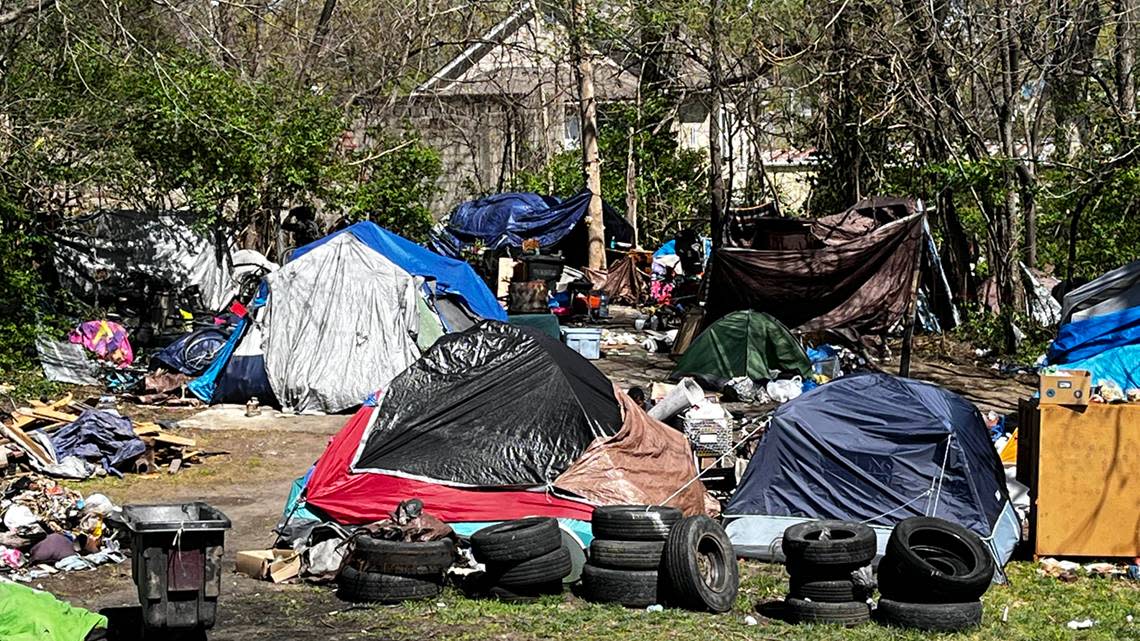U.S. Supreme Court upholds ‘public camping’ ban, and with it, part of Kentucky’s crime law

When the U.S. Supreme Court upheld an Oregon city’s ban on “public camping” by homeless people on Friday, it undermined a planned legal challenge to a similar ban in Kentucky that will take effect July 15.
House Bill 5, dubbed the Safer Kentucky Act by its sponsors, was a sweeping anti-crime law passed in March by the General Assembly.
The Kentucky law’s most controversial section created a new offense, “unlawful camping,” which can result in arrest and fines for people who are trying to sleep in specified public and private spaces that are not designated for camping, including on sidewalks or roadsides, under bridges, or in parks, parking lots, garages or doorways.
The Kentucky law requires local governments to enforce this ban or face sanctions from the attorney general.
The Supreme Court on Friday ruled that a similar ban on public camping in the Oregon city of Grants Pass did not violate the Eighth Amendment’s protection against cruel and unusual punishment, even when a community had no available beds in its homeless shelters.
“As the number and size of these encampments have grown, so have the challenges they can pose for the homeless and others,” Justice Neil Gorsuch wrote for the court’s majority, sympathizing with the city of Grants Pass.
Bans on homeless encampments “encourage their inhabitants to accept other alternatives, like shelters, drug treatment programs and mental health facilities,” Gorsuch wrote.
Given this decision from the nation’s highest court, there’s not much room to challenge the ban in Kentucky’s House Bill 5, homeless advocates said Friday.
“It takes the wind out of everything. It’s kind of heart-breaking,” said Ginny Ramsey, director of the Catholic Action Center, a privately run shelter on Industry Road in Lexington.
Several lawyers had planned to file a lawsuit to challenge Kentucky’s public camping ban in July once someone was arrested for violating it, making a plaintiff available, Ramsey said.
“The really sad part is that our Supreme Court does not think that it’s cruel and unusual punishment to put people in jail for sleeping outdoors when they literally have nowhere else to go in their communities,” she added.
VOCAL KY, an advocacy group for low-income Kentuckians, said in a statement: “The decision sets a precedent to incarcerate, fine and ticket the unhoused just for trying to survive rather than going to the root of the issue, which is that housing is unaffordable for millions of Americans.”
However, the primary sponsor of House Bill 5, state Rep. Jared Bauman, praised the Supreme Court for recognizing why local and state governments might want to restrict where homeless encampments exist.
Illegal street camps can lead to violent crime and destruction of property, said Bauman, R-Louisville. Kentucky’s new law allows local governments the option of establishing an authorized place for public camping away from residential and commercial neighborhoods, he said.
“I applaud the Court’s ruling today, an opinion which, despite what critics will say, underscores the importance of providing the homeless with opportunities for treatment and shelter,” Bauman said.
“The opinion also highlights how crucial it is that homeless individuals participate in such services,” the lawmaker said. “Further, the opinion recognizes that we can’t ignore the public safety and private property interests involved in this complex issue.”
Critics say KY House bill ‘criminalizes poverty’ with penalties for homelessness
KY lawmakers pass crime bill targeting violent felons, fentanyl, homeless, shoplifters


